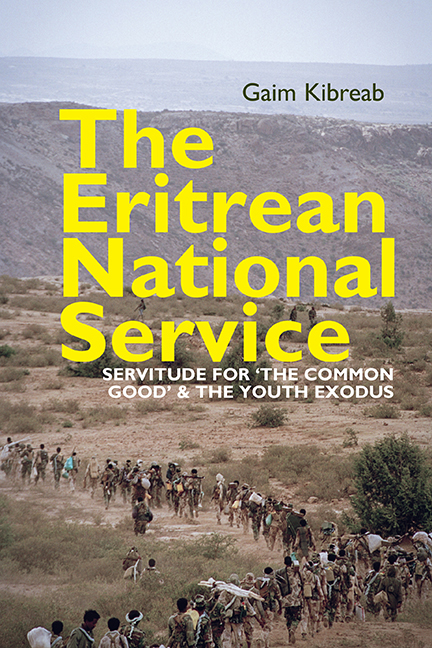Book contents
- Frontmatter
- Dedication
- Contents
- List of Figures and Tables
- Foreword
- Acknowledgements
- List of Acronyms & Abbreviations
- 1 Introduction
- 2 National/Military Service in Africa: Theories and Concepts
- 3 The Government and the Structure of the Eritrean Defence Force
- 4 The Nature of the Eritrean National Service and its Effectiveness as a Fighting Force
- 5 The Eritrean National Service as a Mechanism of Preserving and Transmitting the Core Values of the Liberation Struggle
- 6 The Eritrean National Service: A Vehicle for National Unity and Cohesion
- 7 The Eritrean National Service and Forced Equality
- 8 The Overarching Impact of the Eritrean National Service on the Social Fabric of Eritrean Society
- 9 Impact of the Open-Ended Eritrean National Service on Families and Conscripts
- 10 Conclusion
- Postscript: The UK Upper Tribunal (Immigration and Asylum Chamber) Country Guidance on Eritrea
- References
- Index
- Miscellaneous Endmatter
Foreword
Published online by Cambridge University Press: 11 August 2017
- Frontmatter
- Dedication
- Contents
- List of Figures and Tables
- Foreword
- Acknowledgements
- List of Acronyms & Abbreviations
- 1 Introduction
- 2 National/Military Service in Africa: Theories and Concepts
- 3 The Government and the Structure of the Eritrean Defence Force
- 4 The Nature of the Eritrean National Service and its Effectiveness as a Fighting Force
- 5 The Eritrean National Service as a Mechanism of Preserving and Transmitting the Core Values of the Liberation Struggle
- 6 The Eritrean National Service: A Vehicle for National Unity and Cohesion
- 7 The Eritrean National Service and Forced Equality
- 8 The Overarching Impact of the Eritrean National Service on the Social Fabric of Eritrean Society
- 9 Impact of the Open-Ended Eritrean National Service on Families and Conscripts
- 10 Conclusion
- Postscript: The UK Upper Tribunal (Immigration and Asylum Chamber) Country Guidance on Eritrea
- References
- Index
- Miscellaneous Endmatter
Summary
In this important and innovative book, Gaim Kibreab examines one of the most secretive states in the world, Eritrea, through the prism provided by its system of ‘national service’, which subjects a very large proportion of the population, and especially the youth, to an indefinite period under the control of the state. Drawing both on the analysis of reports in the country's state-controlled media, and especially on interviews with a large and varied number of refugees who have – at the risk of their lives – fled from Eritrea, he is able to provide an insight into many aspects of Eritrean life that have hitherto evaded the attention of researchers. In many ways, the findings of the study confirm what might have been expected. Even though two of the key objectives of national service have been to strengthen the country's defensive capabilities and promote its economic development – its official title is the ‘Warsai-Yikealo Development Campaign’ – the actual effects have been quite the opposite. An army of disgruntled conscripts is unable to replicate the heroism and sense of purpose that drove the epic liberation struggle that culminated in Eritrea's independence in 1991, while the impact on ‘development’ has been disastrous. Particularly important here is the impact on subsistence agriculture and the complex survival mechanisms that have enabled families to spread their risks in an extremely uncertain environment. The gender equality that characterised the liberation struggle has given way to the widespread exploitation of women within the national service system. Yet it is a tribute to the professionalism of the research – in a field often marked by a high level of partisanship on either side – that the author shows how some of the objectives of national service have been achieved. In particular, it has indeed served to promote an enhanced level of national identity and helped to bridge ethnic and religious differences within a country with nine distinct ethnic groups, divided roughly equally between Christianity and Islam. This is ground-breaking research, essential to the understanding of modern Eritrea, and with much to teach us beyond its boundaries.
- Type
- Chapter
- Information
- The Eritrean National ServiceServitude for 'the common good' and the Youth Exodus, pp. xiPublisher: Boydell & BrewerPrint publication year: 2017

